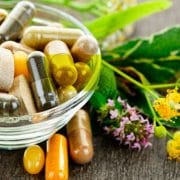Are Antioxidant supplements making you weaker?
 The marketing of antioxidant supplements
The marketing of antioxidant supplements
We have been marketed to by antioxidant supplements for years, with their health and longevity benefits being touted no end. The theory goes something like this:
1. Free radicals, or reactive oxygen species, create oxidative stress and other cellular damage and accelerate the ageing process.
2. Anti-oxidants neutralise free radicals and therefore protect against damage.
3. Therefore, if we consume anti-oxidant supplements it will enhance our disease protection and longevity.
Does the science reflect this theory?
Whilst there is good evidence for points 1 and 2 above, most of the studies in support of number 2 are performed in vitro, i.e., in a test tube or Petri dishes, and not in free-living humans. As for point 3, it may surprise you to discover that numerous clinical trials and metabolic studies show no benefit, or even harm, from using antioxidant supplements. Here are some examples:
- A 2004 American Heart Association meta-analysis of 20 clinical trials showed no benefits for the use of Vitamins C, E and beta-carotene in the prevention of heart attacks or strokes, and no reduction in mortality. Importantly, the authors acknowledged that the scientific evidence from observational studies supports the conclusion that “a diet high in food sources of antioxidants and other cardioprotective nutrients” reduced the risk of cardiovascular disease, they found no support for any benefits from the routine use of antioxidant vitamin supplements.
- A 2008 Cochrane Institute meta-analysis of 67 randomised clinical trials on antioxidant supplements (beta-carotene, vitamin A, vitamin C, vitamin E, and selenium) found no evidence that antioxidant supplements prevent mortality in healthy people or patients with various diseases. The authors said that “treatment with beta-carotene, vitamin A, and vitamin E may increase mortality” and that “potential roles of vitamin C and selenium on mortality need further study”.
- A 2001 University of Washington randomized trial showed evidence of positive harm from taking a cocktail of antioxidants in patients on statin-niacin therapy. The supplements reduced levels of HDL and increased levels of coronary blockage.
- A study at Cedars-Sinai Heart Institute showed that cardiac stem cells that were loaded with high doses of antioxidants developed genetic abnormalities that predispose to the development of cancer.
- A 2009 study by German and American researchers found that daily supplementation with 1000 mg Vitamin C and 400 IU Vitamin E during a 4-week exercise program by healthy young men suppressed improvements in insulin sensitivity and suppressed production of other protective genes observed in the non-supplementing control group.
How is it that administering the same antioxidant chemicals that we are commonly told that make fruits, vegetables and herbs “protective”, actually appears to be ineffective or even harmful when taken as dietary supplements?
A clue comes from the last study quoted above – the 2009 paper that was titled “Anti-oxidants prevent health-promoting effects of physical exercise in humans”. Exercise creates free radicals, which cause metabolic stress, and the body responds by up-regulating powerful protective genes – this is a hormetic response (as covered in my last blog post). Researchers such as Edward Calabrese and Mark Mattson call these genes “vita-genes” because they ramp up our own internal defences against free radicals, which are much more powerful than any pill that we can take.
By taking antioxidant supplements, we suppress the increase in our own internal defences that would otherwise occur in response to the exercise stress.
So, getting back to the antioxidant theory at the start of this post – what is missing in this theory is the role of our body’s own innate defences system for handling toxic chemicals like free radicals. While our immune system handles invading organisms and large proteins, another system is needed to deal with chemical toxins. It’s called the xenobiotic metabolism, and it’s broken into 3 ‘waves’ of protective enzymes – Phase I, Phase II, and Phase III, which act synergistically to protect against damage and disease.
We must understand that the body is an adaptive system and it will adjust to maintain a relatively constant state, known as homeostasis. The science of hormesis states that if you provide it with external “help”, it will reduce the effort in building its own internal defences. Just as being sedentary results in muscle wastage and a decrease in fitness, it turns out that chronic consumption of exogenous antioxidants reduces the “pressure” on your adaptive stress response to ramp up its own endogenous antioxidant defence system. In biological terms, taking antioxidants leads to homeostatic downregulation of the antioxidant response element. This actually makes biological sense: Why should the organism expend precious energy and resources building a defence system if the defence is provided for “free” through diet or supplements?
So it appears that, by consuming more antioxidants, we become dependent upon them and, perversely, we reduce our innate ability to detoxify. So, now that we know that our endogenous antioxidant defence system is so potent, what steps can we take to build it up? We get the answers from the science of hormesis, and I will explore how to up-regulate these powerful natural defences to disease in the next few blogs.



 In my last post, I wrote about the fact that the marketing and hype around taking
In my last post, I wrote about the fact that the marketing and hype around taking